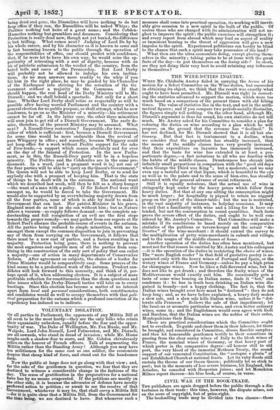THE WINE-DUTIES INQUIRY.
Wirzy Mr. Chisholm Anstey failed in carrying the terms of his motion for a Select Committee on the Wine-duties, but succeeded in obtaining its object, we think that the result was exactly what ought to have been permitted. Mr. Disraeli was right in correct- ing the statistics advanced to support the motion, which were too much based on a comparison of the present times with old bibing times. The value of statistics lies in the text, and not in the arith- metical figures ; and if you compare two periods socially dissimilar, the figures simply tell nothing. On the other hand, although Mr. Disraeli's argument is thus far sound, his own statistics do not tell much. Mr. Anstey asked for his Committee to 'consider a plan for reducing the duties on wine according to a plan which he will propose, on the ground that the revenue has "declined.". It has not declined, for Mr. Disraeli showed that it is all but sta- tionary. But that fact is tantamount to a decline, when we consider that the population has steadily increased, that the means of the middle classes have very greatly increased, that their expenditure on luxuries has immensely increased, and that the taste for wine has extended in at least a pro- portionate degree,—a fact notorious to all who are familiar with the habits of the middle classes. Drunkenness has shrunk into infinitely small proportions in comparison with the "good old days when George the Third was King " ; but a moderate, and we may even say a tasteful use of that liquor, which is beautiful to the eye as well as to the palate and to the sense of bien-etre, has steadily advanced with the general advance of social refinement.
Still it is equally notorious, that the actual use of wine is stringently kept under by the heavy prices which follow from heavy duties. Not that at any one sitting the consumption might be much larger ; for hospitality is piqued to retain no niggard grasp on the jewel of the dinner-table ; but the use is restricted, in the vast majority of instances, to holyday occasions. It may be said that a familiarity with wine and a liking for it have ex- tended, but not the consumption in round quantities. Such facts 'prove the severe effect of the duties, and ought to be well con- sidered by Mr. Anstey's Committee. • That Committee will make a mistake if its conclusions be based merely on the comparative statistics of the publican or tavern-keeper and the actual " de- liveries " of the wine-merchant : it should extend the survey to the multiplication of petty wine-merchants in suburb and village, and to the usages of the middle classes at home.
Another operation of the duties has often been mentioned, but must not for that reason be omitted by Mr. Anstey and his colleagues —it is the operation of the duties in restricting the choice of wines. The "mere English reader" in that field of gustative poetry is ac- quainted only with the heavy wines of Portugal and Spain, or the watery wines of France and Germany—unless he pay a high price for champagne wines. Now he likes a full-flavoured wine, but he does not like to get drunk ; and therefore the fruity wines of the Mediterranean would exactly suit him. He occasionally gets a taste of some wine bearing an Italian name, finds it "hot," and condemns it : he has in truth been drinking an Italian wine dis- guised in brandy—not a happy clothing. The fact is, that the Italian wines brought over here must be doctored " : they do not keep long; and, as we have before explained, a heavy duty makes a slow sale, and a slow sale kills Italian wine, unless it be " dot- torato alla Francese." Relieve the sale of that impediment; let the luscious or aromatic particular wines, and even better ordinary wines, come in ; and the Englishman would soon agree with Redi and Bacchus, that the Italian wines are the nobles of their order, Montepulciano their King. These are practical considerations which the Committee ought not to overlook. To guide and cheer them in their labours, let there be brought, and considered in Committee, divers Bacchic samples; and then let honourable gentlemen testify to their sensations in passing from the clear sunny wines of Italy to the bleak wines of France, the nominal wines of Germany, or that heavy port of which porter is the comparative degree—all honour still to old port, the very blood of the immortal Methuen Treaty, the sound support of our venerated Constitution, the " sostegno e gloria " of our Established Church at national feasts. Let its ruby floods still sustain the throne of our Ocean Queen' politically let us stick to port; but in the moments of less severe business, let England, like Ariadne, be consoled with Hesperian juices; and let Monokton Mines report thereon—his blue book, of course, in verse.


























 Previous page
Previous page